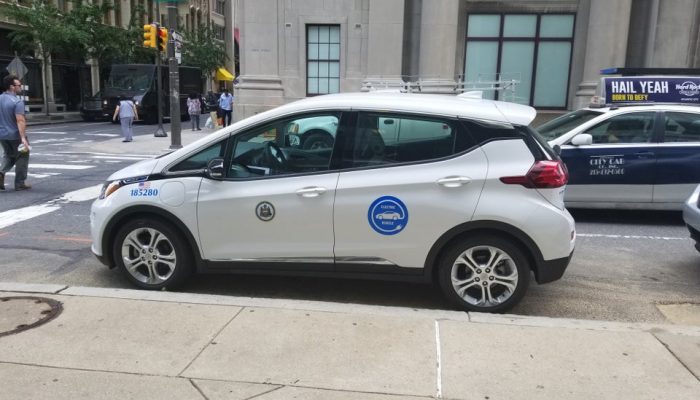The Office of Sustainability, in partnership with the Office of Fleet Management, have released Philadelphia’s Municipal Clean Fleet Plan which lays out a strategy to transition the City’s fleet of around 6,000 vehicles to clean and electric vehicles.
The City’s fleet currently represents around 13% of the municipal government’s carbon footprint and so tackling emissions from this sector is a necessary step in achieving Mayor Kenney’s goal of carbon neutrality by 2050. Additionally, the transition will allow the City to achieve cost savings, improve air quality, support local job creation and to enhance Philadelphia’s competitiveness among peer cities.
The Municipal Clean Fleet Plan is part of a broader push by the City of Philadelphia to lead on climate action and was supported by the Bloomberg Philanthropies American Cities Climate Challenge. Philadelphia is one of the 25 winning cities in the Climate Challenge, which is helping cities set and surpass ambitious climate goals by ramping up action in the two highest-emitting sectors in cities: transportation and buildings.
Among some of the Plan’s key recommendations are:
- Setting new goals to create a pathway to zero emissions, including procuring no new gas-powered vehicles after 2030.
- Instituting a clean fleet procurement policy and establishing a vehicle procurement hierarch that prioritizes battery electric vehicles, but also aims to reduce the overall size of the fleet and the share of SUVs.
- Establishing a Clean Fleet Committee, directed by a new Transportation Electrification Manager, and with participation from several City agencies to oversee infrastructure issues and track goals.
- Optimizing alternative fueling and recommend the development of an electric vehicle infrastructure deployment scenario to minimize the costs of charging infrastructure.
To operationalize these actions, Managing Director Tumar Alexander issued Managing Director’s Directive #69 on the Clean Fleet Policy to establish the clean fleet hierarchy and the Clean Fleet Committee.
Led by the Office of Innovation and Technology’s Smart Cities program, the City has also released a request for information (RFI) to learn more about the metering options for electric vehicle charging infrastructure. This information will help determine a next step in procuring metering to capture data on energy use, costs, avoided emissions, and other operational information.
Nationally, transportation is the largest source of carbon emissions, which is why the Biden Administration has prioritized vehicle electrification in its efforts to address climate change and to protect and grow American jobs. Government agencies around the country are transitioning their fleets and seeing the benefits of doing so, including major operational savings. Auto manufacturers are also getting in the game, such as General Motors who announced they will stop producing gas-powered cars by 2035.
The City is no stranger to electric and alternative-fueled vehicles. The first plug-in hybrid electric vehicles were procured in 2014, and there are now almost 500 vehicles that are a mix of hybrids, plug-in hybrids, compressed natural gas-powered, and fully battery electric. The City also manages about 50 electric vehicle charging stations.
While electric vehicles can cost more up-front than gas-powered vehicles, analysis shows significant fuel and maintenance savings can offset these costs. Additionally, there are several grant programs the City can take advantage of, such as Pennsylvania’s Alternative Fuel Incentive Grant program.




